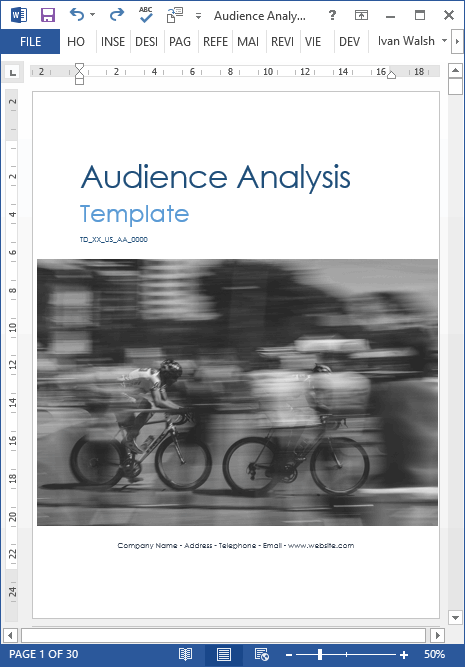Business Writing
4 Writing Tactics from Desperate Housewives (+ Audience Analysis template)
Can one hour with Eva Longoria really make you a better business writer? I guess it all depends on the angle you take. Here’s what I mean.
Let’s say you feel a little bit guilty when watching your favorite TV show. You can’t help wondering if there is ANY way you could apply what’s happening on the screen to your business? Why? Maybe sales are down, customers are slow to pay, and you can’t figure out this Social Media game.
Watching Desperate Housewives suddenly feels like a guilty pleasure. Shouldn’t you be working instead?
Audience Analysis Template
DOWNLOAD – 30-page MS Word template with MS Excel spreadsheet with 130 entries.
Use this template to learn more about the target audience for your projects and what they want to achieve, for example, read your user guide, visit your website or buy your product.
Instant Download – Only $9.99!
DOWNLOAD – 30-page MS Word template with MS Excel spreadsheet with 130 entries.
The worksheets include 130 points you can use to capture demographic date so that you have a more holistic view of their wishes, desires, fears, and preferences.
How Desperate Housewives Can Make You a Better Business Writer
Unless you’re super-human, you need time to wind down and get away from the laptop.
Most of us turn to the web or TV. Or both.
Now, let’s say you’re watching Desperate Housewives. Or CSI. Or House. Or even the ads… it doesn’t matter.
…as long as you watch them from the right angle, you can benefit.
By the way, I don’t mean your position on the sofa, rather how you analyse what’s going on.
Here’s the deal.
- Storytelling – the new mantra is business communications is storytelling. In theory, you’re more convincing if you can build your brand, product or service around a story. Think of the Steve Jobs redemption story at Apple. There’s a great stage play in there.
- Narrative – to make your marketing messages more compelling, you need to develop a persuasive narrative. This weaves different themes into a single cohesive message.
- Natural Language – you also need to write in the same ‘everyday’ language that customers use. Talk to them on their level. Not down (patronizing). Not up (trying too hard).
- Emotions – we don’t buy iPhones because they’re faster, cheaper, or more long-lasting. We buy them because they make us feel better, smarter, cooler and other things. Though, of course, we find ways to rationalize it.
What’s this got to do with Desperate Housewives?
As you’re watching the show, look at it through the eyes of the writers. They’ve studied YOU for a long time and know what presses your buttons. That’s their job and they’re very good at it!
Notice how they use:
- Conflict. Create conflict and sub-plots that make you side with one character more than another.
- Themes. Introduce themes into the plot to keep you hooked. Injustice, hope, fear, envy.
- Pace. By shifting the tone, length of scenes and action points, you get pulled along. If the pace was constant all the time, it would feel wooden and predictable. A problem the writers on 24 have to deal with.
- Heroes. Every show needs a hero (or anti-hero). The industry term is protagonist but it serves the same purpose. When you watch Desperate Housewives, you’re probably rooting for your hero or heroine.
Conclusion
I don’t know about you but I find it very hard to stop thinking about work… maybe because I love it so much. I’m always looking for new ideas and tactics I can introduce into my business.
Here’s the thing about Desperate Housewives, or House, or Monday Night Football.
A staggering amount of work goes into these productions. They don’t succeed by accident.
The next time you’re watching them, sit back and see what ideas you can take and apply to your business. Maybe it’s the presentation, the scripting, or the characters. Or something else.
For me, it’s often to do with persuasion. What are they doing to persuade me to watch it again next week? I know I have better things to do but…
Make sense?
Do you get ideas when watching TV shows? If so, what works best?



